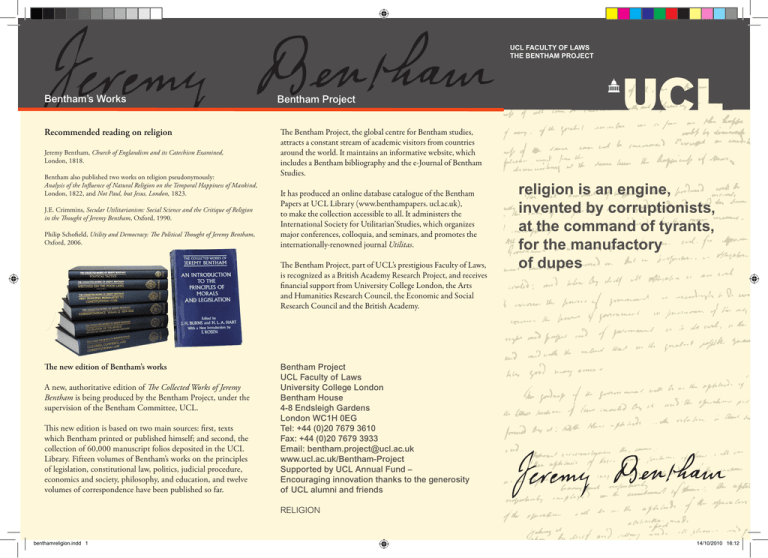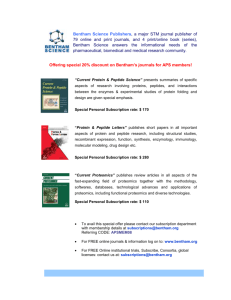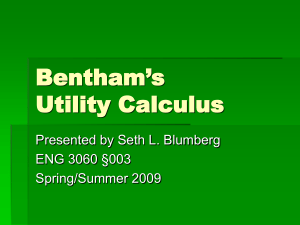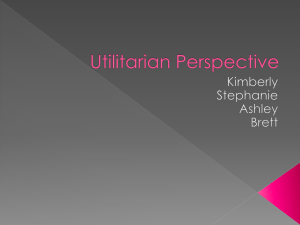Bentham’s Works Bentham Project Recommended reading on religion
advertisement

UCL FACULTY OF LAWS THE BENTHAM PROJECT Bentham’s Works Recommended reading on religion Jeremy Bentham, Church of Englandism and its Catechism Examined, London, 1818. Bentham also published two works on religion pseudonymously: Analysis of the Influence of Natural Religion on the Temporal Happiness of Mankind, London, 1822, and Not Paul, but Jesus, London, 1823. J.E. Crimmins, Secular Utilitarianism: Social Science and the Critique of Religion in the Thought of Jeremy Bentham, Oxford, 1990. Philip Schofield, Utility and Democracy: The Political Thought of Jeremy Bentham, Oxford, 2006. Bentham Project The Bentham Project, the global centre for Bentham studies, attracts a constant stream of academic visitors from countries around the world. It maintains an informative website, which includes a Bentham bibliography and the e-Journal of Bentham Studies. It has produced an online database catalogue of the Bentham Papers at UCL Library (www.benthampapers. ucl.ac.uk), to make the collection accessible to all. It administers the International Society for Utilitarian’Studies, which organizes major conferences, colloquia, and seminars, and promotes the internationally-renowned journal Utilitas. The Bentham Project, part of UCL’s prestigious Faculty of Laws, is recognized as a British Academy Research Project, and receives financial support from University College London, the Arts and Humanities Research Council, the Economic and Social Research Council and the British Academy. The new edition of Bentham’s works A new, authoritative edition of The Collected Works of Jeremy Bentham is being produced by the Bentham Project, under the supervision of the Bentham Committee, UCL. This new edition is based on two main sources: first, texts which Bentham printed or published himself; and second, the collection of 60,000 manuscript folios deposited in the UCL Library. Fifteen volumes of Bentham’s works on the principles of legislation, constitutional law, politics, judicial procedure, economics and society, philosophy, and education, and twelve volumes of correspondence have been published so far. religion is an engine, invented by corruptionists, at the command of tyrants, for the manufactory of dupes Bentham Project UCL Faculty of Laws University College London Bentham House 4-8 Endsleigh Gardens London WC1H 0EG Tel: +44 (0)20 7679 3610 Fax: +44 (0)20 7679 3933 Email: bentham.project@ucl.ac.uk www.ucl.ac.uk/Bentham-Project Supported by UCL Annual Fund – Encouraging innovation thanks to the generosity of UCL alumni and friends RELIGION benthamreligion.indd 1 14/10/2010 16:12 ‘In attempting to deduce moral duties or political regulations from the consideration of a Deity, we turn about in circles: but we advance not a single jot.’ Bentham Papers, UCL Jeremy Bentham’s dissatisfaction with established religion manifested itself in 1764 when, at the age of 16, he was required to subscribe to the Thirty-nine Articles of the Church of England in order to take his degree at the University of Oxford. He overcame his disquiet and did subscribe. But the experience left its mark—throughout his life he resented the fact that he had been, as he saw it, coerced into compromising his intellectual integrity. Bentham thought that religious belief resulted in increased misery for the individual. Given that fear was a stronger motive than hope, the religious believer would worry about the prospect of eternal damnation rather than look forward to the prospect of eternal happiness. If God was benevolent and all-powerful, as Christians believed, why was there evil in the world? God was, therefore, either not benevolent, or not all-powerful. Bentham is often described as an atheist, but the notion © COPYRIGHT UCL Library Services of committed non-belief does not quite capture his position. Rather, his view was that nothing could be known about the supernatural. All our knowledge was derived from sense-perception. It was, therefore, nonsense to claim that we had knowledge of things which were beyond or outside perception. Anyone who claimed to have perceived the supernatural was, in Bentham’s view, either mistaken or lying. The fact that we could have no knowledge of the supernatural led to one of Bentham’s distinctive principles, namely that theology should have no influence on morals and legislation. Religion was likely to have a pernicious influence on both. Hence Bentham was a champion of the secular society. The legislator who was influenced by religion would introduce religious offences, which would lead to the punishment of persons for engaging in harmless activities – for instance not following the rites of an established church or engaging in sexual practices which ‘religion’ condemned. Moreover, political and religious leaders combined to maintain their dominant position in society, using religion as one means to delude, and thereby oppress, the majority of the population. Bentham developed striking views on the origins of Christianity. Jesus was the leader of a revolutionary movement, who hoped to become King of the Jews. Only when his movement was crushed by the Romans did his supporters transform the kingdom from this world to another world. Jesus’ injunctions were not universalizable into a sound basis for morality (only the principle of utility could provide this), but were entirely appropriate for the support of a mass insurrection in the time and place in question. WELD TAYLOR AFTER HENRY HALL PICKERSGILL, 1832 This lithograph is taken form the published lecture given by Thomas Southwood Smith over Bentham’s body in the Webb Street School of Anatomy on 9 June 1832, when Smith fulfilled Bentham’s desire that before iconization his body should be publicly dissected to further anatomical knowledge. © COPYRIGHT UCL Library Services AUTO-ICON OF JEREMY BENTHAM Created by Thomas Southwood Smith in 1833, and presented to UCL in 1850. Bentham’s auto-icon constitutes, at least in part, a continuation of his attack on religion. A human being is, in the end, a material thing – a combination of biological processes taking place within a physical structure – no more and no less. ‘It is impossible that Theology can throw any light upon either morality or jurisprudence.’ Bentham Papers, UCL benthamreligion.indd 2 14/10/2010 16:12



